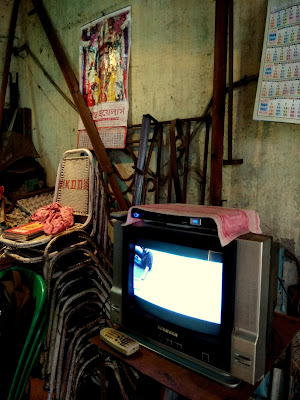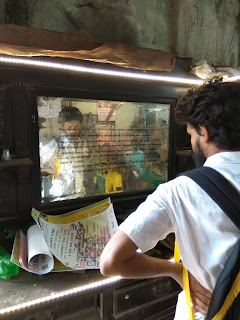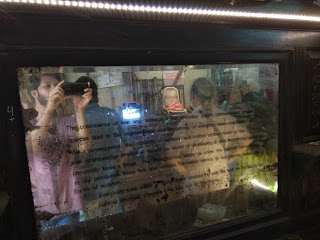"They live we sleep" A video installation under Conflicting space.
venue: Howrah and Sweden. Date: 21 April to 30 April 2017.
Conflicting
space is a project under Srinagar Biennale where rather than public art project
this exchange is about making a visual narrative between two different
conflicting spaces. Both the spaces “Howrah and Sweden” in one hand carrying a
potential living historical memory, on the other hand also has the hidden
possibilities of contradiction. In this Art project the artist from India and
Sweden are trying to question and explore the area of hidden possibilities
through their different kind of medium. The exchange and the collaborating with
two curator one is from Sweden Tamara de Laval and Chi muk from India starts
with a dialogue between the artist which is more about idea of space, intimacy,
bonding, struggle, body, labor and contradiction of nature and culture. Also
the artists are trying to evolve the possibilities of conflict between visible
and invisible line where there is always much hidden disturbance and conflict
within the space and the space become the boisterous silence.
 |
| Video still from "They live we sleep" |
Here
the idea of this project, collective is very important role in my practice.
Because of this reason I like the idea of Conflicting space where this project
not limited only to produce an Art product for final display. Though it is
important also this project focus on process which can help to share, discuss
with each other work and going through a collective approach. Also it helps to
Artistic growth where every steps going through research based.
 |
| Video still from "They live we sleep" |
During
this project my question is that how to executed multidisciplinary work. Space
and context has important role of my work which are very fragmented. Basically
I am talking about site specific installation as well as live performances.
Meanwhile those works are very fragile / temporary and on the other hand the
Art performances have the same quality like work has finished when you ended
your performances. Perhaps we took pictures / video as documentation and
showing it somewhere. Indeed, there is always one question that how to
documented this kind of works? I did the same things like I took photographs
and moving clips. If I represent this documentation in front of viewer what
should be the format. I believe that representation should carry the essence or
mood of the work. Sometimes I used sound in my installation and my performances
which were recorded from nature and from different objects. I want to
juxtaposed those materials like sound, photographs and moving clips embodied
some drawing transformed in many small clip of stop motion animation. Those
clips display in a digital devices and install it in space which is selected
according to the concept. This works are initially worked in performance and site specific which is work later in digital format.
 |
| process of the display at Shibpur, Howrah |
I am working
in a video format with some of my performance juxtaposed with moving clips. This
project residue was not to display in white cube format, so I chose an active
iron factory near Shibpur, Howrah to install the video. Firstly the factory
owner doesn’t want to agree with our idea of the display because they afraid of
disturb by our work and finally agreed with us. During the conversation they always question
us about what it is? Why it is here? What we will do after this? and many
unpolished question forced to think about the idea of Art and public. Also they
were very happy to communicate with us as well as the viewer for the space,
even later period of the display they were able to talk about the project with
the viewer. Even they wish to provide that space for the future. Indeed, the
whole idea is not only display an Art in factory; it is about to collaboration
with the worker, communication as well as participation in the factory and art
itself.
 |
| the video is played in a old TV |
In that
factory there is very old wooden Almirah with a big mirror and the Almirah is
used for their tools. My video was played in old TV in front of the mirror.
Viewer can see them-self in the mirror. Indeed, I used some
text in the mirror (see the image) when viewers were reading the text they can
see self images with the video. The space has a sound produces from the welding
machine and the worker enhancing my idea and the site specificity.
 |
| the text in the mirror |
Here is the
text in the mirror “The coexistence of fear and violence in
our everyday public, personal and private spaces lead to the regimentation and
disciplining of everyday work conditions. As a consequence, the possibility of
workers’ self-control on their work in the area of knowledge production as well
as scope of developing of anti-hegemonic subjectivity constantly faces a
threat. The ‘thoughtpolice’ keeps us under the invisible surveillance. In my
perception these fear and violence fabricated silence in our psyche embodied a
frame of isolation. Everybody lives within a frame that’s created by us as well
as by social or political structure. There is no way out of this frame.”
 |
| as usual day of the factory with the installation |
 |
| opening day of the "conflicting space" |
 |
| viewer reading the text on the mirror |
 |
| public and the work |
This project is
exchange program between Howrah and Sweden, the video was displayed in a restaurant
at Malmo, Sweden. The customer was waiting for the food and they are watching
unusual video before the food.
“They live we sleep” is
a series of multidisciplinary approaches where trying to explore the frame of isolation
where subconscious uncertainty hidden within it. In this project I experiment in
video where juxtaposed images in different manner with moving clip.
 |
Video install in a restaurant at Malmo, Sweden.
|
By Anupam Saikia, Anga Art collective, Assam














